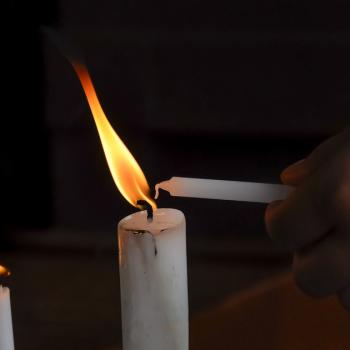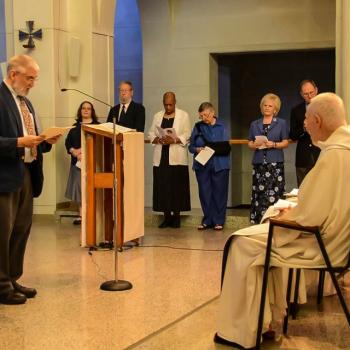Once again, Alison Leigh Lilly wows me with the elegance, beauty and insight of her writing. The fact that her most recent blog post begins with something I tweeted yesterday is not only a delight in itself for me, but her reflections in that post are so rich and relevant to concerns that I am wrestling with in my own current writing that it seems, well, serendipitous.
The piece is called Why I Cannot Tell You About My Gods. And yes, “Gods” is meant to be plural, for Alison is a Pagan, her theology actually a polytheology. If anyone reading this doubts the richness that can come from interfaith conversation, please see Alison’s post to see how a thoughtful Pagan writer can take a simple comment from a Christian and weave a wonderful reflection on the spirit of language and its relationship to the earth and the body. Her post leads off with the following tweet I made yesterday, along with the subsequent response from her husband, Jeff.
Language is tricky. Every word or phrase that reveals God also conceals God. Why? Because God is bigger than the limits of the human mind.
— Carl McColman (@CarlMcColman) September 19, 2013
@CarlMcColman Language does this to all sacred things… Which is to say, language does this to all things. 🙂
— Jeff Lilly (@druidjournal) September 19, 2013
From there, Alison muses on the way we talk and think about language itself, leading to the kind of metaphorical assumptions, not only about language but about theology, that underlie my tweet. And that’s where it gets really good, for she considers how language is embodied in our breath, our voice, our web of interrelationships with the earth, the sky, the wind. She sensibly sets the word “God” (or “Gods”) down and picks up the word “chair” instead, using it to weave a richly-textured meditation on how language ignites a symphony of memories and imagination to convey meaning, literally through the air of voice and sound, or through the earth of printed page or flashing screen. While she never overtly denies the Neo-Platonic transcendence that lurks behind most Christian God-talk, she is grounded (pardon the pun) in her recognition and insistence that language itself is a function of the earth and the body.
That’s what got me so excited about her post, for the book proposal I am currently working on (more or less a follow-up to Answering the Contemplative Call, although I’m not calling it a sequel because I intend it to work as a stand-alone book) is all about the relationship between mysticism, the land, and the human body. I don’t want to say too much about that right now, since it is still very much in a working draft. But here are a few tidbits for you to groove on: humility (the queen of the virtues) comes from humus, a word that not only means “soil” but a particularly stable kind of soil, “organic matter that has reached a point of stability, where it will break down no further and might, if conditions do not change, remain as it is for centuries, if not millennia” as Wikipedia puts it. Such stability, of course, calls to mind the richness of the Benedictine tradition, and its understanding of the relationship between humility and stability. While we have a societal idea that humility is about self-abnegation (and yes, that comes straight out of excesses within the Christian tradition), a more holistic way of thinking about humility is to see it as radical earthiness, or embodied spirituality — in clear contrast to the spiritualizing tendencies of Neoplatonic mysticism.
A humble person is someone truly at home in his or her body, which means radically at home on the earth (in the biosphere). Such embodied/earthy spirituality is profoundly necessary in our time, when we are rapidly approaching a potential cascade of environmental disasters that will not destroy the earth (she’s much too big for us to obliterate), but will surely leave homo sapiens (and plenty of other species) extinct. And perhaps this great risk of our species’ extinction, which is really a form of mass suicide (pun intended), is at least exacerbated by, if not very much caused by, our cultural insistence on spirit/matter dualism, which I think goes back to a profound misreading of Plato and Plotinus (in other words, Plato and Plotinus, thank heaven, are not Neo-Platonists!). When we divorce spirit and matter, heaven and earth, God and nature, we are left with a spirituality of abstraction that does little more than serve the interests of those who would use it as a method of social control; meanwhile, we are also left with a way of relating to the earth that is disenchanted, thereby enabling us to exploit nature rather than revere it. To halt this dual-toxicity of enervated spirituality and exploited materiality, we need to re-embody mystical spirituality with an earthiness that I believe is found in Christ and the most holistic of Christ’s followers (not to mention in some pretty amazing wisdom traditions outside of the Christian community).
Okay, I’ll stop there. But this is what I’ve been playing with… and so, you can see (once you read Alison’s post, if you haven’t yet go do so already!) why Why I Cannot Tell You About My Gods excites me so much.
Thank you, Alison. You are such a gifted writer.
Enjoy reading this blog?
Click here to become a patron.















